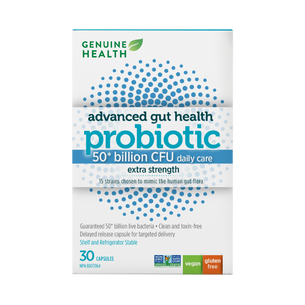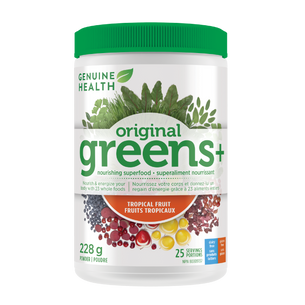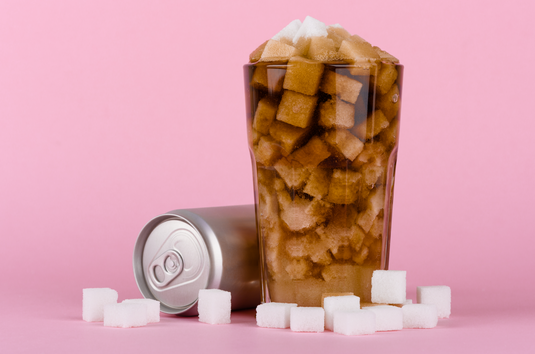How gut health supports less stress

Let’s talk about stress, because let’s face it, we all experience it. Following and during the pandemic, the number of people who felt stressed regularly almost doubled from 17% to 33%.¹ Over 96% of Canadians reported a period of stress after the pandemic.¹ That “gut feeling” we have and the “butterflies” in our stomach during emotional situations is your brain sending signals to your gastrointestinal system aka, your gut.
Your gut is comprised of the large and small intestines, not just the stomach as many people believe.10 The main engine for our health is found in the gut and it is called the microbiome. The gut microbiome is revolutionizing researchers' understanding of the link between digestion, mood, health, even the brain.11
So what is the microbiome? Our body is full of bacteria, fungi, yeast and viruses- these microorganisms are collectively known as the microbiome.2 Interesting fact: The gut microbiome is so enormous that there are 100,000 times more microbes in your gut than there are people on earth.3 In a healthy person, these microorganisms coexist peacefully, with large numbers found in the small and large intestines but also throughout the body. We often associate bacteria with disease, but now we know that many are extremely important for your immune system, your heart, your weight, and many other aspects of health. The gut microbiome is an important part of a feedback loop that protects and signals the body to facilitate important metabolic processes.4
Your microbiome also helps your brain feel happy: new research suggests that the gut microbiome affects mood and stress.5 Our digestion tends to mirror our mental wellness. The gut is physically connected to the brain through your vagus nerve, and there is constant communication back and forth- we often call this the gut-brain connection.6 Certain strains of bacteria help produce mood regulating neurotransmitters, for example, serotonin and dopamine which are our feel-good hormones that are mostly made in the gut. Research is beginning to show a direct relationship between the balance in our gut bacteria and the level of neurotransmitters in our body.6
Paying attention to our gut-brain connection can help alleviate your stress.5 We can influence the health of our gut microbiome by seeding it with probiotics-the good microbes that keep our bodies in synergy.7 With a diverse blend that is designed to balance your gut naturally, Genuine Health’s probiotics can increase and restore the good bacteria. This can in turn also strengthen our gut brain connection. Then we need to feed our gut with greens that contain phytonutrients: nutrients in plants that exert antioxidant effects in our body.8 Genuine Health’s greens+ helps to feed our gut with the nutrients it needs to positively influence our microbiome.
For further support, Genuine Health’s stress is here to keep you calm, relaxed and rested, even on your most stressful days. stress is uniquely formulated to help you manage and reduce common symptoms of stress such as fatigue, weariness and irritability. Our formula contains saffron extract (affron®), which has been used for thousands of years in traditional medicine for its calming effects. Saffron has been research-proven to regulate and improve your body’s natural stress response. It’s believed that saffron balances neurotransmitters and delivers an antioxidant effect which supports a healthy inflammatory response.9 Each dose also includes adaptogenic (stress-supporting) ashwagandha (KSM-66 Ashwagandha®) and passionflower extract to help promote feelings of relaxation, while encouraging restorative sleep. With consistent use, every capsule will help you cope with life’s challenges with more ease and build long-term resilience to both mental and physical stress.
When we support our gut, we support our bodies’ resilience to stress!
References
- Mental Health Statistics in Canada. Made in CA. Accessed September 19, 2024. https://madeinca.ca/mental-health-statistics-canada/
- Microbiome. National Institute of Environmental Health Sciences. Accessed September 19, 2024. https://www.niehs.nih.gov/health/topics/science/microbiome
- Our second brain: More than a gut feeling | UBC Magazine. May 19, 2023. Accessed September 19, 2024. https://magazine.alumni.ubc.ca/2023/spring-2023/health-science/our-second-brain-more-gut-feeling
- O’Malley MA. The concept of balance in microbiome research. BioEssays. 2024;46(8):2400050. doi:10.1002/bies.202400050
- Foster JA, Rinaman L, Cryan JF. Stress & the gut-brain axis: Regulation by the microbiome. Neurobiology of Stress. 2017;7:124-136. doi:10.1016/j.ynstr.2017.03.001
- Liang S, Wu X, Jin F. Gut-Brain Psychology: Rethinking Psychology From the Microbiota–Gut–Brain Axis. Front Integr Neurosci. 2018;12. doi:10.3389/fnint.2018.00033
- Sánchez B, Delgado S, Blanco-Míguez A, Lourenço A, Gueimonde M, Margolles A. Probiotics, gut microbiota, and their influence on host health and disease. Molecular Nutrition & Food Research. 2017;61(1):1600240. doi:10.1002/mnfr.201600240
- Holst B, Williamson G. Nutrients and phytochemicals: from bioavailability to bioefficacy beyond antioxidants. Current Opinion in Biotechnology. 2008;19(2):73-82. doi:10.1016/j.copbio.2008.03.003
- Mzabri I, Addi M, Berrichi A. Traditional and Modern Uses of Saffron (Crocus Sativus). Cosmetics. 2019;6(4):63. doi:10.3390/cosmetics6040063
- Services D of H& H. Gut health. Accessed September 23, 2024. http://www.betterhealth.vic.gov.au/health/healthyliving/gut-health
- Bull MJ, Plummer NT. Part 1: The Human Gut Microbiome in Health and Disease. Integr Med (Encinitas). 2014;13(6):17-22.





















































